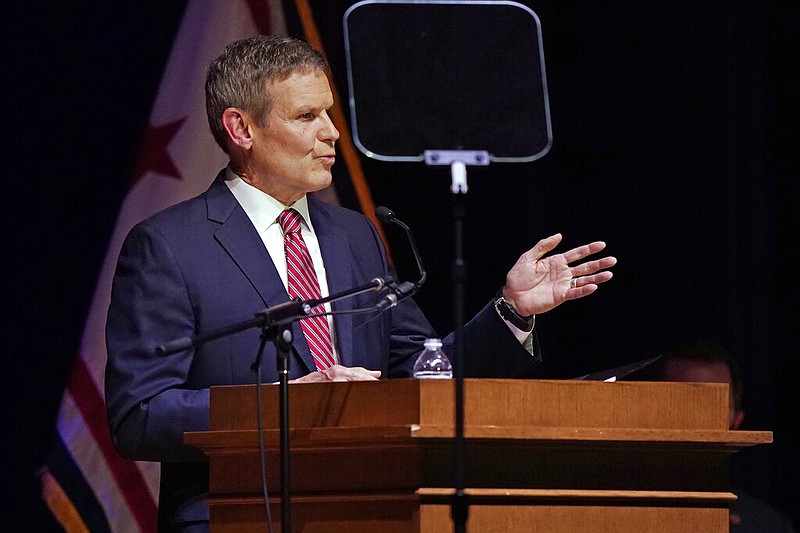Tennessee Gov. Bill Lee touted the state's newly approved Medicaid program as a victory in his State of the State Address on Monday, while at the same time acknowledging its uncertain future under the new Biden administration.
Lee committed to use the new program funding mechanisms "to do important work like shortening the waiting list for those with intellectual and developmental disabilities who need services.
"Let me be clear: if partisan attacks that call for this block grant to be rescinded prevail, the state will not get these shared savings dollars that we plan to use to improve health care for vulnerable Tennesseans," Lee said.
In President Donald Trump's final days, the federal government approved a 10-year renewal of TennCare - the state's Medicaid program that uses a combination of state and federal funds to provide health insurance coverage to approximately 1.4 million low-income families and children, pregnant women and disabled Tennesseans.
The new program - called TennCare III - exists under a waiver, which allows states to operate outside of traditional Medicaid rules. Although many state Medicaid programs operate under waivers, Tennessee's new program is a departure from the traditional Medicaid in that it gives the state more flexibility and potential to receive more federal dollars through what Lee calls "shared savings" if TennCare spends less than anticipated.
But with those potential benefits come new uncertainties for enrollees, causing concern among advocates who call TennCare III an ideological experiment on the state's most vulnerable.
As the General Assembly moves to fast track implementation of TennCare III, an executive order signed by President Joe Biden on Jan. 28 suggests the program as it stands now may be short-lived.
Biden's Executive Order on Strengthening Medicaid and the Affordable Care Act calls for review of "demonstrations and waivers, as well as demonstration and waiver policies, that may reduce coverage under or otherwise undermine Medicaid or the ACA."
Andy Schneider, a research professor at the Georgetown Center for Children and Families, said although the broad language of the order leaves many unknowns, there's little doubt that new federal regulators will be scrutinizing TennCare.
"I would expect that the Tennessee waiver approval, as well as a number of others that were made by the previous administration, are going to get looked at in light of this executive order. That much, I'm confident about," Schneider said.
Two major unknowns are who will be reviewing the waiver, since Biden's pick for the U.S. Department of Health and Human Services secretary and a permanent Centers for Medicare and Medicaid Services administrator have yet to be approved by the Senate, as well as when the review process will begin.
Schneider suspects that Tennessee's waiver won't get first priority, since two other waivers needing review - those that impose work requirements for Medicaid recipients in Arkansas and New Hampshire - are set to go before the Supreme Court.
"We know that there's not litigation urgency around the TennCare waiver in the same way that there is around the work requirements waivers," Schneider said. "I think as a practical matter, you're looking at March before this review even starts."
The Trump administration implemented additional roadblocks that could further lengthen the process, and TennCare III could also face legal challenges.
"There's actually a serious legal issue around whether the secretary has the authority to let the state receive federal dollars without spending its own. The point of the shared savings - from the state's standpoint - is that we get more money without spending our own, and there's no precedent for that in the Medicaid program," Schneider said.
Michele Johnson, executive director of the Tennessee Justice Center, said that the state could expand health care coverage for more vulnerable Tennesseans by expanding Medicaid under the Affordable Care Act instead of fashioning a complex, new funding structure that's not been tested.
"This isn't about shared savings, because Medicaid expansion by now would have brought us $8 billion. They have refused to take advance of that, so it isn't about the money - it's about the ideology," Johnson said, adding that Tennessee already has "one of the leanest Medicaid programs in the nation."
"I don't know how we can cut any more dollars out of it without hurting families," she said.
Among all the uncertainties, Schneider is confident that policymakers are heading into uncharted waters.
"I don't remember a situation where midstream a [waiver] like this has been reversed or terminated or seriously modified," he said. "But I also don't remember a time in the past when the policy direction has been so different between one administration and the next."
Contact Elizabeth Fite at efite@timesfreepress.com or follow her on Twitter @ecfite.
